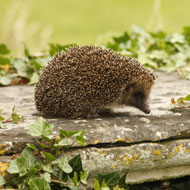Early spring ‘could spell disaster’ for wildlife

Hedgehogs and other wild animals are starting to emerge from hibernation early.
Unusually warm weather is prompting UK wildlife to come out of hibernation early, which could spell disaster when the weather turns cold again.
This is the stark warning from the RSPB, which has received a number of reports about birds attempting to nest and breed, butterflies emerging, ducklings being born and hedgehogs, reptiles and insects coming out of hibernation.
Even migrant birds such as swallows and house martins are appearing back in the UK, weeks earlier than they would normally be expected.
The Met Office is predicting another week of mild conditions, followed by a return to unsettled, wet and windy weather in March.
Charlotte Ambrose from the RSPB’s wildlife team, said: “Birds rely on environmental cues such as temperature to know when to start making a nest and start breeding. Because of the extremely mild weather, some birds and other wildlife are starting early.
“This is not necessarily a bad thing as it may allow some birds to have an extra brood before the main breeding season starts, but if the weather changes back to more normal conditions, the birds may get caught out and struggle to find enough food for themselves and their young.
“If invertebrates emerge early they will be here when the early nesting birds and their chicks need them, but again a cold snap could mean they don’t survive. Any sudden bad weather can kill-off early flowering plants, which are a source of nectar for insects, meaning they will struggle to find enough food.”
Martin Harper, the charity’s director of global conservation, said that the warmer weather should “ring alarm bells” as these early signs of spring are likely down to climate change.
“As we expect the weather to return to temperatures more traditionally associated with this time of year – as they are forecast to – then there could be a real crisis for our birds, insects and other wildlife,” he added.
Members of the public are being urged to help garden wildlife survive the possible cold snap by providing energy-rich foods including meal worms and fat balls, putting up nest boxes, planting pollen-rich flowers and offering fresh water for drinking and bathing.



 The latest
The latest